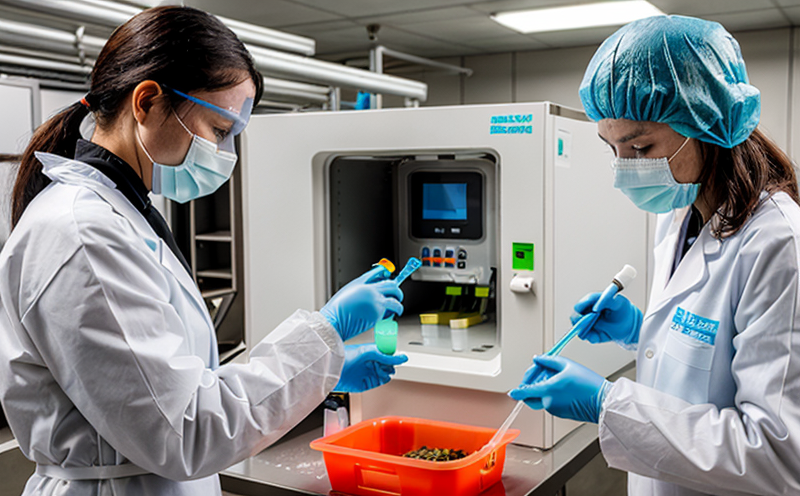ISO 6887-1 Microbiological Examination Sample Preparation Test
The ISO 6887-1 standard provides a comprehensive framework for conducting microbiological examinations of environmental samples. This service is pivotal in ensuring compliance with international standards and regulatory requirements, particularly within sectors where environmental quality is critical such as water treatment facilities, agricultural products, and industrial processes.
ISO 6887-1 focuses on the preparation phase, which is a crucial step before conducting microbiological analysis. The correct handling of samples ensures accurate and reliable results that are essential for making informed decisions regarding product safety and environmental impact. This service is particularly important in industries where contamination can lead to significant consequences, including health risks or legal disputes.
The process involves several key steps: collection, transportation, preservation, and preparation of the sample. Each step must be executed meticulously to prevent any alteration of the sample's composition that could affect the test results. The service ensures adherence to these critical procedures through a team of experienced microbiologists who have extensive knowledge in environmental testing.
The importance of this service cannot be overstated, especially for quality managers and compliance officers. By ensuring strict adherence to ISO 6887-1 standards, they can maintain the integrity of their products or processes, thereby enhancing overall product safety and regulatory compliance.
For R&D engineers and procurement professionals, this service offers a valuable tool in developing new products or sourcing materials that meet stringent microbiological purity requirements. It also provides insights into potential contamination sources and mitigation strategies, which are essential for continuous improvement.
The ISO 6887-1 standard is particularly relevant to industries such as water treatment facilities where the presence of microorganisms can affect public health. In agriculture, it ensures that crops and products are free from harmful pathogens. In industrial processes, it helps in maintaining a clean environment, which is crucial for preventing contamination and ensuring product quality.
The service involves rigorous sample preparation techniques to ensure that the sample accurately represents the environmental conditions being tested. This includes thorough cleaning of sampling equipment, controlled storage conditions during transport, and precise handling to avoid cross-contamination.
Once collected, samples are subjected to specific preservation methods to maintain their integrity until analysis can be conducted. These methods may include refrigeration or freezing, depending on the nature of the sample and the microorganisms being tested. The use of appropriate preservatives is also crucial in preventing degradation of the sample during transport.
The sample preparation process itself is complex and involves several steps to ensure that it is suitable for microbiological examination. This includes homogenization of the sample, dilution if necessary, and plating or inoculation onto selective media. Each step requires careful attention to detail to avoid altering the sample's composition or introducing contaminants.
The use of advanced instrumentation such as spectrophotometers, colony counters, and automated microbiological systems enhances the accuracy and efficiency of the testing process. These tools provide precise measurements and counts that are critical for interpreting the results correctly.
Reporting is an essential part of this service, providing detailed information on the sample's composition, any detected microorganisms, and their characteristics. This report serves as a valuable resource for decision-makers in understanding the microbiological status of the environment being tested.
Applied Standards
The ISO 6887-1 standard is widely recognized and applied across various sectors due to its stringent requirements and comprehensive approach. Some key standards that align with this service include:
ISO 4833: This international standard specifies methods for counting viable microorganisms in water by means of dilution.
ASTM E2197: This American Society for Testing and Materials standard provides guidance on the preparation of samples for microbiological examination of environmental air.
EN ISO 11260: This European standard outlines procedures for sampling and sampling equipment in relation to soil quality assessment, which is crucial for ensuring compliance with local regulations.
The adherence to these standards not only ensures consistency but also enhances the credibility of the test results. Compliance officers can rely on these standards to ensure that their environmental testing practices meet international benchmarks.
Scope and Methodology
The scope of this service encompasses a wide range of applications where microbiological examination is crucial for ensuring product safety, environmental quality, and compliance with regulatory requirements. The methodology involves several key components:
Sample Collection: Proper collection techniques are essential to avoid contamination and ensure accurate results.
Transportation: Samples must be transported under controlled conditions to maintain their integrity until analysis can be conducted.
Preservation: The use of appropriate preservatives helps in maintaining the sample's composition during transport.
Preparation: This step involves homogenization, dilution if necessary, and plating or inoculation onto selective media to ensure that the sample is suitable for microbiological examination.
The methodology also includes the use of advanced instrumentation such as spectrophotometers, colony counters, and automated microbiological systems. These tools provide precise measurements and counts that are critical for interpreting the results correctly.
Reporting is an essential part of this service, providing detailed information on the sample's composition, any detected microorganisms, and their characteristics. This report serves as a valuable resource for decision-makers in understanding the microbiological status of the environment being tested.
Customer Impact and Satisfaction
Enhanced product safety: By adhering to ISO 6887-1 standards, customers can ensure that their products meet strict regulatory requirements, thereby enhancing consumer confidence.
Improved environmental compliance: This service ensures that environmental samples are accurately analyzed, leading to better compliance with local and international regulations.
The customer impact extends beyond mere compliance; it also contributes to the overall quality of products and processes. By ensuring accurate microbiological examination, customers can prevent contamination issues, improve product performance, and reduce the risk of recalls or legal disputes.
Customer satisfaction is paramount in this service. Our team of experienced microbiologists works closely with clients to understand their specific needs and ensure that all samples are handled with utmost care. Regular communication throughout the process keeps our customers informed and involved, ensuring a seamless experience from sample collection to final report delivery.





